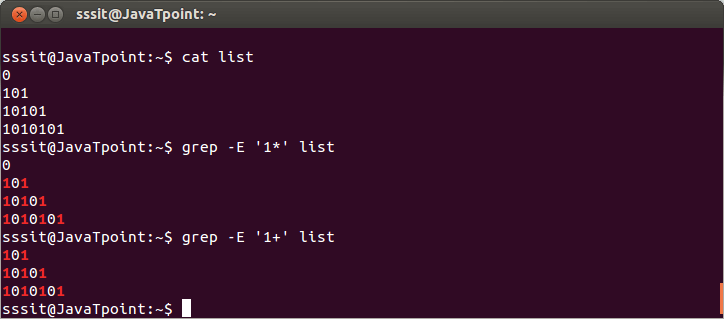

Regexes are much more flexible than traditional text searches. You can use regex to specify a string of characters or pattern for grep to match instead of words. Grep ‘word’ file1 file2 file3 grep ‘username’ /etc/passwd Grep is used to find what you’re looking for, stored anywhere in the file system matching a specified pattern. Grep stands for “global regular expression print”. Linux comes with GNU grep command which supports regex. It’s much more powerful than a simple string comparison, and is almost universally supported across programming languages, frameworks, and text editors. Its flexible and powerful syntax lets you create detailed search patterns, from simple words and phrases to complex constructs like e-mail addresses and phone numbers. Regex is a special text string/language used for describing search patterns and matching strings in text. Let’s cover exactly what Regular Expressions are, what they’re used for, benefits, and some examples. rw-r-r- 1 root root 8287 Oct 26 17:57 07.pemīut if I do not use -l on ls, then it returns the proper results that I am looking for, so clearly my regex is correct: ls keys/ | grep -E '*2.If you’ve ever had to search, parse, or edit blocks of text programmatically, chances are you’re familiar with regular expressions (also known as regex or regexp). rw-r-r- 1 root root 8287 Oct 26 17:57 linuxtest-client2.crt
Grep with regular expression serial#
rw-r-r- 1 root root 3 Oct 26 17:57 serial rw-r-r- 1 root root 1793 Oct 26 17:57 linuxtest-client2.csr rw- 1 root root 3394 Oct 26 17:57 linuxtest-client2.key rw-r-r- 1 root root 8287 Oct 23 20:54 linuxtest-client1.crt rw-r-r- 1 root root 3 Oct 23 20:54 serial.old rw-r-r- 1 root root 1793 Oct 23 20:54 linuxtest-client1.csr rw- 1 root root 3394 Oct 23 20:54 linuxtest-client1.key rw-r-r- 1 root root 8264 Oct 23 19:48 removemetest.crt rw-r-r- 1 root root 1785 Oct 23 19:48 removemetest.csr rw- 1 root root 3394 Oct 23 19:48 removemetest.key Why are the file sizes being trigger by this grep when there is no period after them?: ls -ltr keys/ | grep -E '*2.*' This causes results to be returned that have a "2" in the file size, date, and time. When I grep for the middle portion of the filename, "2.", it also returns lines that contain "2" in addition to "2." when using ls -l with it. This includes multiple file extensions (csr, crt, key).

Using grep to search for all files linuxtest-client2.


 0 kommentar(er)
0 kommentar(er)
